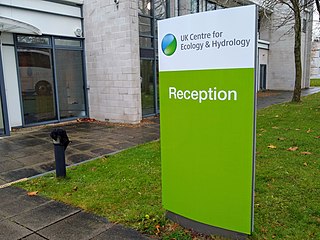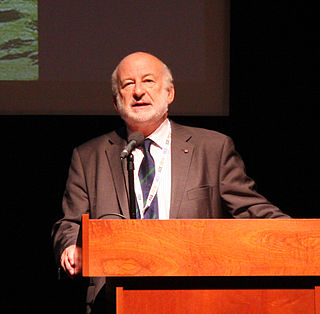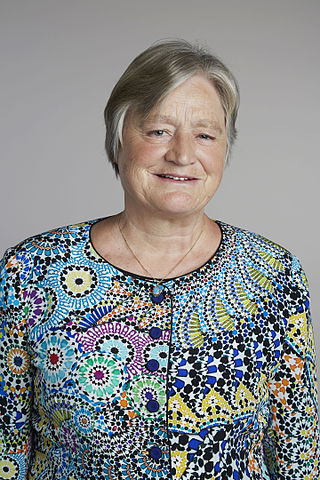Sir Thomas Richard Edmund SouthwoodGOM DL FRS was a British biologist, professor of zoology and vice-chancellor of the University of Oxford. A specialist on entomology, he developed the field of insect ecology and the development of study techniques. He wrote a landmark textbook on Ecological Methods that went into numerous editions. He also was well known for developing the field of entomology through mentorship of a circle of researchers at Silwood Park.
Phil Ineson is a chair in Global Change Ecology at the University of York. Ineson is particularly noted for his work with stable isotopes.
The Natural Environment Research Council (NERC) is a British research council that supports research, training and knowledge transfer activities in the environmental sciences.
The Biological Records Centre (BRC) established in 1964, is a national focus in the UK for terrestrial and fresh water species recording.
Sir John Hartley Lawton is a British ecologist, RSPB Vice President, President of the Yorkshire Wildlife Trust, President of The Institution of Environmental Sciences, Chairman of York Museums Trust and President of the York Ornithological Club.

The UK Centre for Ecology & Hydrology (UKCEH) is a centre for excellence in environmental science across water, land and air. The organisation has a long history of investigating, monitoring and modelling environmental change. Research topics include: air pollution, biodiversity, chemical risks in the environment, extreme weather events, droughts, floods, greenhouse gas emissions, soil health, sustainable agriculture, sustainable ecosystems, water quality, and water resources management.
Marcus Thomas Pius Gilbert is an evolutionary biologist. His work is very highly cited, and influential in the fields of palaeogenomics, evolutionary genomics and evolutionary hologenomics. He is currently the Director of the University of Copenhagen's Center for Evolutionary Hologenomics

John Anthony Pickett CBE DSC FRS FLSW is a British chemist who is noted for his work on insect pheromones. Pickett is Professor of Biological Chemistry in the School of Chemistry at Cardiff University. He previously served as the Michael Elliott Distinguished Research Fellow at Rothamsted Research.

Julia Mary Slingo is a British meteorologist and climate scientist. She was Chief Scientist at the Met Office from 2009 until 2016. She is also a visiting professor in the Department of Meteorology at the University of Reading, where she held, prior to appointment to the Met Office, the positions of Director of Climate Research in the Natural Environment Research Council (NERC) National Centre for Atmospheric Science and founding director of the Walker Institute for Climate System Research.
Patricia (Pat) Anne Nuttall, OBE is a British virologist and acarologist known for her research on tick-borne diseases. Her discoveries include the fact that pathogens can be transmitted between vectors feeding on a host without being detectable in the host's blood. She is also a science administrator who served as the director of the Natural Environment Research Council (NERC) Centre for Ecology & Hydrology (2001–11). As of 2015, she is professor of arbovirology in the Department of Zoology of the University of Oxford.

John Philip Burrows is professor of the Physics of the Ocean and Atmosphere and Director of the Institutes of Environmental Physics and Remote Sensing at the University of Bremen. He is also a Fellow of the Centre for Ecology and Hydrology (CEH), part of the Natural Environment Research Council (NERC).
Ruth Mace FBA is a British anthropologist, biologist, and academic. She specialises in the evolutionary ecology of human demography and life history, and phylogenetic approaches to culture and language evolution. Since 2004, she has been Professor of Evolutionary Anthropology at University College London.
Dr John D. Goss-Custard is a British behavioural ecologist; he was one of the first scientists to carry out field work on foraging behaviour making use of optimising models, specifically the optimal diet model. After completing a BSc degree in Zoology at the University of Bristol, he moved to the University of Aberdeen to carry out research for a PhD degree, which he was awarded in 1966. The University of Aberdeen awarded him its DSc degree in 1987.
Rosemary S. Hails is a British population ecologist and entomologist and the current Director of Science and Nature at the National Trust for Places of Historic Interest or Natural Beauty. Prior to this appointment she was the Director of Biodiversity and Ecosystem Science for UK Centre for Ecology and Hydrology, managing and directing the science of 350 ecologists and hydrologists, in collaboration with the Science Director for Water and Pollution Science. Professor Hails successfully led the development of UKCEH's national capability research programme delivered by the Research Centre, which cuts across the complete portfolio of expertise. She has led the Valuing Nature Programme for NERC, since October 2014, and is currently a CoInvestigator in the NERC Funded "RENEW" and "RestReco" Projects. In 2000, she was made a Member of the Most Excellent Order of the British Empire (MBE) for services to environmental research.
Helen Elizabeth Roy, is a British ecologist, entomologist, and academic, specialising in ladybirds and non-native species. Since 2007, she has been a principal scientist and ecologist at the NERC's Centre for Ecology & Hydrology. From 1997 to 2008, she taught at Anglia Ruskin University, rising to the rank of Reader in Ecology. She is the co-organiser of the UK Ladybird Survey, alongside Dr Peter Brown, is a visiting professor in the School of Biological Sciences, University of Reading, is co-chair of the IPBES assessment of invasive alien species, and is a past President of the Royal Entomological Society.
Sarah Wanless is an animal ecologist in the UK and is an expert on seabirds; she is a Fellow of the Royal Society of Edinburgh and is Honorary Professor at the Universities of Glasgow and Aberdeen.
Lynn Dicks is a conservation scientist and ecologist in the UK. She is Professor of Zoology at the University of Cambridge, and Honorary Reader at the University of East Anglia, and an expert in sustainable farming and insect conservation.
Bridget Emmett is a British ecologist, Professor and Science Area Head for the UK Centre for Ecology & Hydrology. She is the President of British Ecological Society from 2024.




